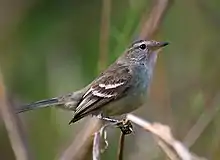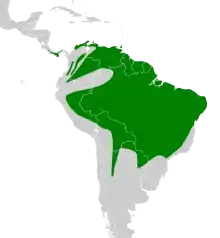Mouse-colored tyrannulet
The mouse-colored tyrannulet (Phaeomyias murina) is a species of bird in the tyrant flycatcher family Tyrannidae. It occurs in a wide range of scrubby and wooded habitats in tropical and subtropical South America, being absent from the southernmost part of the continent, the high Andes and dense rainforest. It also occurs in Panama and Costa Rica. It is generally common, but its small size and dull plumage results in it often being overlooked – or at least not identified, as it resembles several other tyrant flycatchers.
| Mouse-colored tyrannulet | |
|---|---|
 | |
| At Piraju, São Paulo State, Brazil | |
| Scientific classification | |
| Kingdom: | Animalia |
| Phylum: | Chordata |
| Class: | Aves |
| Order: | Passeriformes |
| Family: | Tyrannidae |
| Genus: | Phaeomyias |
| Species: | P. murina |
| Binomial name | |
| Phaeomyias murina (Spix, 1825) | |
 | |
Four subspecies are recognised:[2]
- Phaeomyias murina eremonoma Wetmore, 1953 – Panama
- Phaeomyias murina incomta (Cabanis & Heine, 1860) – Colombia, northeast Ecuador, Venezuela and Trinidad
- Phaeomyias murina wagae (Taczanowski, 1884) – The Guianas, Amazonian Brazil, east Peru and northwest Bolivia
- Phaeomyias murina murina (Spix, 1825) – south Brazil, south Bolivia, Paraguay and northwest Argentina
The mouse-colored tyrannulet was formerly considered conspecific with the Tumbesian tyrannulet (Phaeomyias tumbezana) that occurs west of the Andes in southwest Ecuador and northwest Peru. The two species are visually very similar, but vocally distinct.[3]
References
- BirdLife International (2016). "Mouse-colored Tyrannulet". IUCN Red List of Threatened Species. International Union for Conservation of Nature. Retrieved 27 June 2019.
- Gill, Frank; Donsker, David, eds. (2019). "Tyrant flycatchers". World Bird List Version 9.2. International Ornithologists' Union. Retrieved 27 June 2019.
- Rheindt, Frank E.; Norman, Janette A.; Christidis, Les (2008). "Genetic differentiation across the Andes in two pan-Neotropical tyrant-flycatcher species". Emu. 108 (3): 261–268. doi:10.1071/mu08020.
